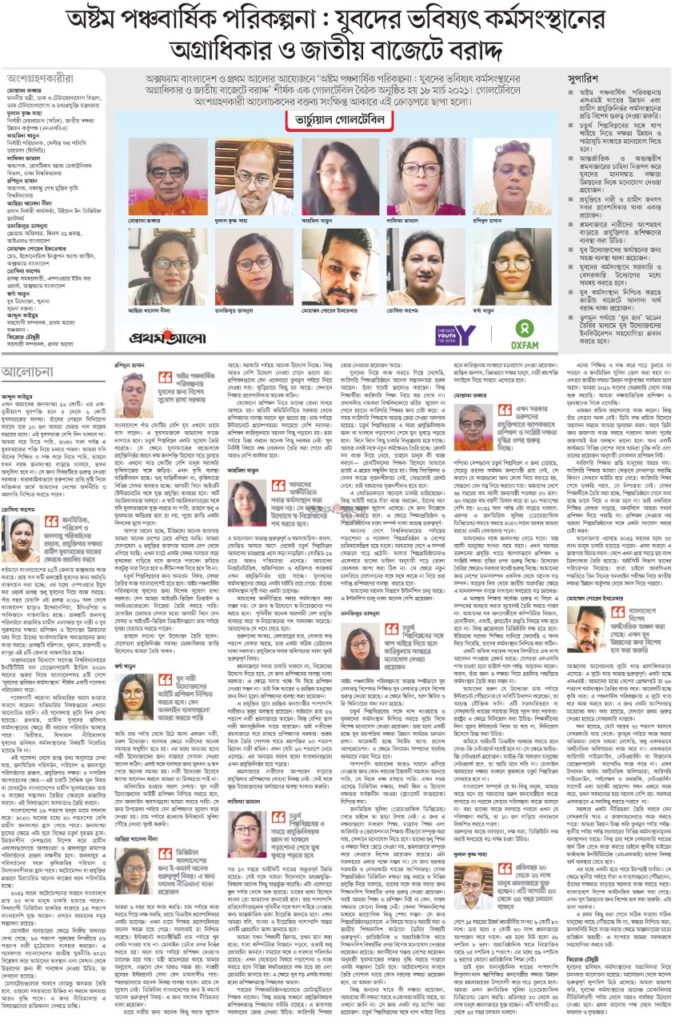Preparing youth for the Future of Work - Bangladesh
In Bangladesh, as elsewhere, Covid-19 has accelerated the automation of traditional industrial practices using modern smart technology, heralding an age known as the ‘fourth industrial revolution’. However, if the nation is to capitalize on its youthful population, it must equip its young people with the skills they need to succeed – or pay a heavy price.
This was the overriding message from a virtual roundtable event on future youth employment, jointly organized by Oxfam and the national daily newspaper, Prothom Alo, in March 2021 and attended by a number of high-profile guests. These included Post and Telecommunications Minister Mustafa Jabbar, who said: “Over the past 12 years the government has given full effort to materialize Digital Bangladesh. Now in 2021, the people understand what it is all about. Our challenge is to transform the huge population into human resources.”
Executive Chairman of the National Skills Development Authority (NSDA), Dulal Krishna Saha, explained that Bangladesh is presently enjoying “demographic dividends” with its youthful population, and asserted that the focus must be on technology. He pointed out that 600,000 freelancers have been created so far, and added that NSDA is working towards the dream of Bangladesh becoming a developed country by 2041.
Leaving no one behind
The Executive Director of the Centre for Policy Dialogue (CPD), Fahmida Khatun, emphasized the need to ensure that young people and women aren’t left behind. She said: “The fourth industrial revolution has been accelerated by coronavirus. Dependence on technology at a personal level and for work has greatly increased. However, our employment is not increasing in proportion to our economic growth. It is imperative to have a database on how many young people there are, and how many are unemployed.” She added: “Women’s participation in the readymade garment industry is falling due to the increase in technology. Women are not adequately trained in technology, and so are dropping out.”
Young female entrepreneur Swarna Khatun also made the most of the opportunity to highlight the many barriers young women face to entering the labour market. “We do not get bank loans for our businesses,” Swarna told participants. “They use the excuse that we are unmarried. There is also the problem of (lack of) capital. We face problems when we try to open up stores in the market. That is why we need to pay attention to online business.”

Bridging the gaps
The challenges faced by women were also highlighted by Asiya Khaleda, Chief Executive Officer of Women in Digital Platform. She noted that young people in rural areas are still dependent on mobile data as the internet service is not adequate. Khaleda also pointed out that it is more difficult for women to access technology, and called for improved internet facilities at a rural level.
Dhaka University professor Lafifa Jamal stressed the need to bridge the gap between industry and education, so that young people are equipped to meet the demands of the labour market when they finish their education. She stated: “A link needs to be set up between the industrial establishments and the educational institutions, so that the institutions can build up the students as required by the industrial establishments. In the next step, the industrial establishments will train students according to their needs. Currently this link is lacking.”
Prepare now – or pay later
Sweeping changes will have to be made to the educational curriculum in order to meet the challenges of the fourth revolution, according to Tanjilut Tasnuva, Programme Officer of the International Labour Organization (ILO). Systemic reforms have to be brought about, and jobs created for youth, alongside education and training. The Head of Oxfam’s Economic Inclusion and Justice department, Mohammad Shoeb Iftekhar, agreed, and urged the government to provide more support for young people. He said: “The government is setting up 100 economic zones around the country. If that can be done, why can’t something be done for the youth?”
The priority action emerging from the roundtable could be summed up by the following reflections of Roshidul Hasan, Professor of Bangabandhu Sheikh Mujib Agricultural University: “Youth must be equipped with skills in order to meet the fourth industrial revolution. Unless we prepare now, the nation will have to pay a heavy price.”
The major recommendation of the Roundtable Discussion:
1. In the coming (8th) 5 year Government country strategic plan of Bangladesh, special emphasis will be given to the development of the SME sector and rural technology-based employment.
2. To adapt to the Fourth Industrial Revolution, we need to focus on skills development and curriculum reform.
3. Focus on developing quality skills of the youth by determining the demand of the international and domestic labor market.
4. It is essential for everyone, including women and rural people, to get access to technology.
5. Technical training needs to be provided to increase women's participation in the labor market.
6. Young entrepreneurs need to have easy arrangements for financing
7. Youth employment needs to be coordinated between public and private initiatives.
8. Separate funds need to be allocated in the national budget to ensure youth employment.
9. Incubation support should be provided to young entrepreneurs by creating a ‘Youth Hub’ model at the grassroots level.
Souces:

